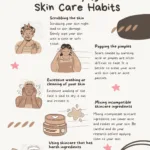Natural fairness creams are skincare products that promote a fairer complexion using predominantly natural or plant-based ingredients. These creams are an alternative to traditional fairness creams that may contain synthetic or potentially harsh chemicals.
The specific ingredients in natural fairness creams can vary, but they often include botanical extracts, herbal ingredients, essential oils, and plant-based moisturizers. Taken together, these ingredients can gradually improve complexion and eliminate skin problems.
However, it’s not just about the ingredients. Taking the same ingredients and mixing them in a lab yourself will be a chemical accident at best. The formulation is very important—And two creams with similar ingredients but different formulations will work differently.
This is mainly why different natural fairness creams have different degrees of reliability and results. Only a few natural fairness creams can guarantee results well within a month, and they are always made with FDA-approved ingredients safe for use for both, men and women. For example, the shea butter based Whitening Cream or any cream based on essential oils.
The best fairness cream for women or men might not be all-natural but it’s important to focus more on the safety that comes with natural fairness creams rather than more pronounced or faster results. Over the long run, a high-quality natural fairness cream will beat the best fairness cream that uses synthetic chemicals to work.
What are the Common Natural Fairness Cream Ingredients?

Natural ingredients found in skincare products, including natural fairness creams, can have various benefits for the skin. However, it’s important to understand that the effectiveness of these ingredients can vary depending on several factors, including the concentration of the ingredient, formulation, individual skin type, and specific skin concerns.
Many natural ingredients used in skincare have been studied for their potential benefits and have shown positive effects on the skin.
- Licorice extract: Licorice extract is known for its skin-brightening properties. It helps to inhibit the production of melanin, which can reduce hyperpigmentation and even out skin tone.
- Turmeric: Turmeric is a popular natural ingredient used in skincare for its anti-inflammatory and antioxidant properties. It can help improve skin tone, reduce the appearance of dark spots, and provide a natural glow. A 2016 study noted how topical turmeric/curcumin products can provide skin health benefits including helping with acne, facial photoaging, atopic dermatitis, and so on.
- Aloe vera: Aloe vera has soothing and hydrating properties, making it beneficial for various skin concerns. It can help moisturize the skin, reduce inflammation, and promote a healthier complexion.
- Papaya extract: Papaya extract contains enzymes like papain, which has exfoliating properties. It can help remove dead skin cells, promote cell renewal, and improve the overall brightness and texture of the skin.
- Saffron: Saffron is often used for its skin-lightening properties. It can help reduce the appearance of dark spots and blemishes, giving the skin a more radiant and even-toned appearance.
While these natural ingredients can offer benefits to the skin, it’s important to note that individual results may vary. Skincare is highly personal, and what works for one person may not work the same for another.
Additionally, the effectiveness of natural ingredients may be more subtle and take longer to show results compared to certain synthetic ingredients or medical treatments.
What to Keep in Mind When Buying a Natural Fairness Cream?

You can’t just buy any fairness cream! It’s important to make sure that the product is a good investment. Whether you’re interested in quicker results or long-lasting effects—Here are some considerations to keep in mind when shopping for a natural fairness cream online.
- Ingredient transparency: Look for products that clearly list their ingredients. Avoid products that have vague or generic terms like “fragrance” or “plant extract” without specifying the actual ingredients used. Transparency allows you to know what you’re applying to your skin and helps you assess the effectiveness and safety of the product.
- Research the ingredients: Take the time to research the individual ingredients in the natural fairness cream. Look for scientific studies or reputable sources that support the claims and benefits of those ingredients. Understand how the ingredients work and whether they align with your specific skincare needs. Even the best men fairness cream or fairness cream for women might use a few ingredients that can be problematic. Be careful and deliberate before purchasing.
- Certifications or labels: Look for certifications or labels that indicate the product meets certain standards or criteria. For example, organic certifications can assure that the ingredients were grown without the use of harmful pesticides. Additionally, cruelty-free or vegan labels indicate that the product was not tested on animals or contains no animal-derived ingredients.
- Patch test: Before applying the cream all over your face, perform a patch test. Apply a small amount of the product on a small area of your skin, such as the inner forearm, and observe for any adverse reactions or sensitivities. This helps identify potential allergic reactions before applying the product to your face.
- Skin type: Ensure that the natural fairness cream is suitable for your specific skin type and concerns. If you have oily skin, look for lightweight formulas that won’t clog pores. If you have dry skin, consider creams with moisturizing ingredients to provide adequate hydration. If you have specific concerns like hyperpigmentation, choose a cream that targets those concerns with ingredients known to address them effectively. You can use Healthline’s Skin Type Test to determine your type accurately.
In Conclusion
It’s essential to listen to your skin, understand its unique needs, and make choices based on thorough research and consideration. If you have specific skin concerns or sensitivities, consulting with a dermatologist can provide personalized advice and recommendations.


